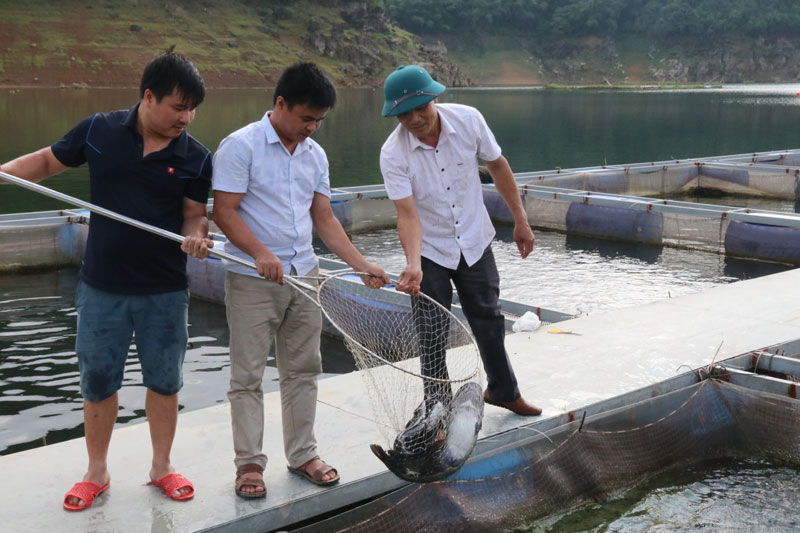
(HBO) - Hoa Binh Lake is large, clean, and rich in resources that make it highly suitable for the development of raising fish in cages. In recent year, Hoa Binh City and the four districts of Cao Ohong, Da Bac, Tan Lac, and Mai Chau have paid attention to investment in cage fish farming projects. A number of communes in the Hoa Binh Lake area have seen the practice booming; they include Thung Nai (Cao Phong), Ngoi Hoa (Tan Lac), Hien Luong, Tien Phong, Vay Nua (Da Bac), Phuc San, and Ba Khan (Mai Chau).

Residents of Hien Luong commune invest in cage fish farming on the
lake.
The standing board of the Party Committee of Hoa Binh
province issued Resolution 12-NQ-TU on June 13, 2014 on the development of cage
fish farming on the lake area for 2014 – 2020. The document set the goals of
developing 3,500 fish cages that produce 5,600 tonnes of fish and create
livelihoods for 2,800 people by 2020. It also aimed at forming production models
linking firms with farmers and cooperatives, thus creating concentrated
production areas and effective aquaculture production chains.
The province is home to 35 businesses, cooperatives and family-based
farms engaging in large-scale intensive farming of fish in cages. Among them,
two firms have invested in over 200 modern fish cages, resulting in high
productivity and quality products. Most of the cages used in the practice are
now made of iron instead of bamboo with the standard volume of 70 – 100 m3
each. Meanwhile, almost all participating households have met technical
specifications and followed safety regulations. Seven enterprises have signed
cooperation contracts with local farmers to raise VietGap-standard fish in
cages. Businesses also commit to buy all fish from farmers.
In addition, Hoa Binh has successfully built a chain of safe
fish products from cage farming on Da River. The province now has 4,250 fish
cages, up 1,933 cages from 2015 and surpassing Resolution 12’s goal set for
2020 by 750 cages. Under the resolution’s policy, 2,602 cages or 56.9 percent
of the total has received support./.
In Lac Thuy district, communes have been succeeded in promoting their One Commune-One Product (OCOP) products while others are still struggling to position their typical farming products in market. Some communes in the district still fail to have their products met OCOP programme’s requirements, while others have seen their certifications expired.
The inspectorate agency of Hoa Binh province has issued Official Dispatch No. 1090/TTr-PCTN to provincial departments, agencies, localities, business associations, enterprises, and investors regarding measures to improve informal component indexes of the Provincial Competitiveness Index (PCI).
Hoa Binh is taking concrete steps to improve its investment environment, with a strong focus on supporting businesses, settling obstacles for strategic investors, and creating opportunities for robust development in the coming years.
Under the blazing early summer sun, the construction site of Nhuan Trach Industrial Park (IP) in Luong Son district is abuzz with activities from dawn to dusk, a testament to the determination of the investor to meet their construction targets on schedule.



